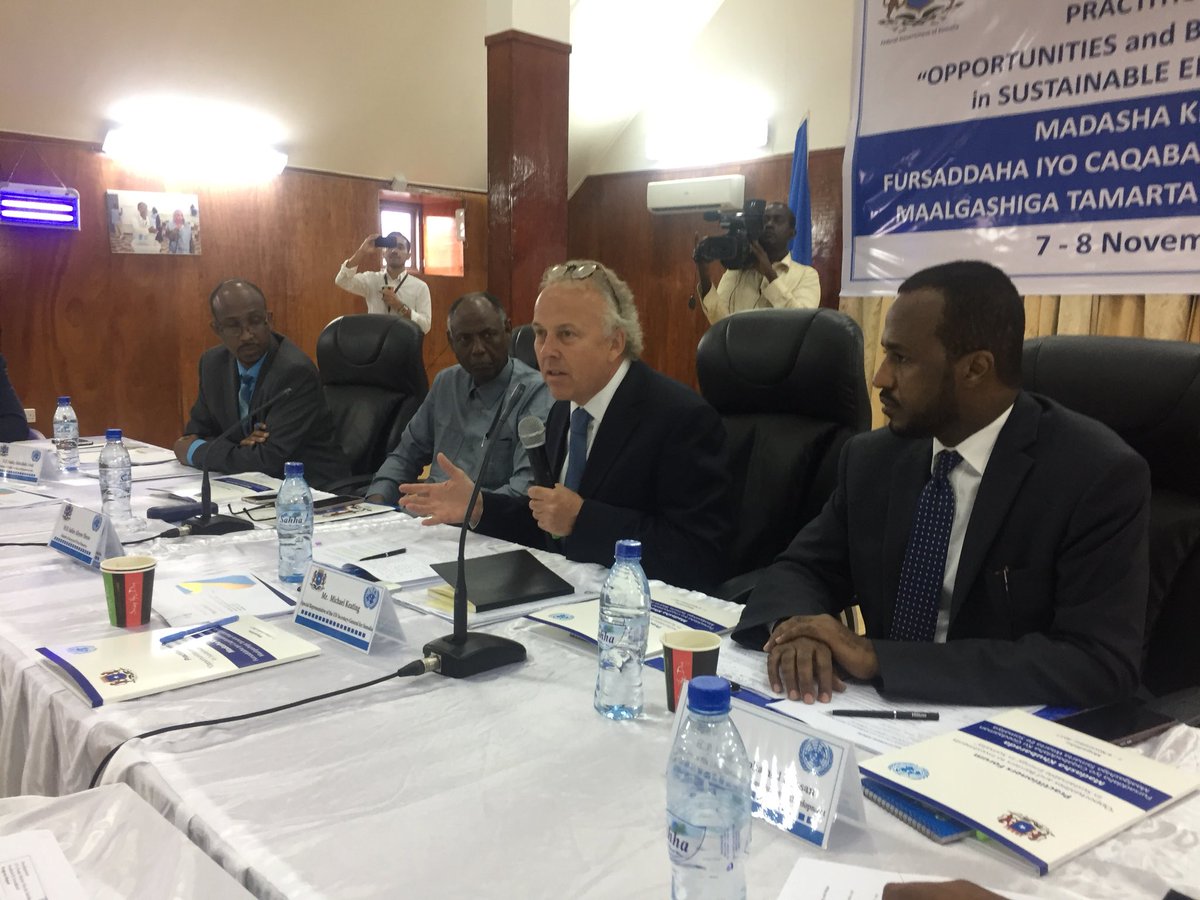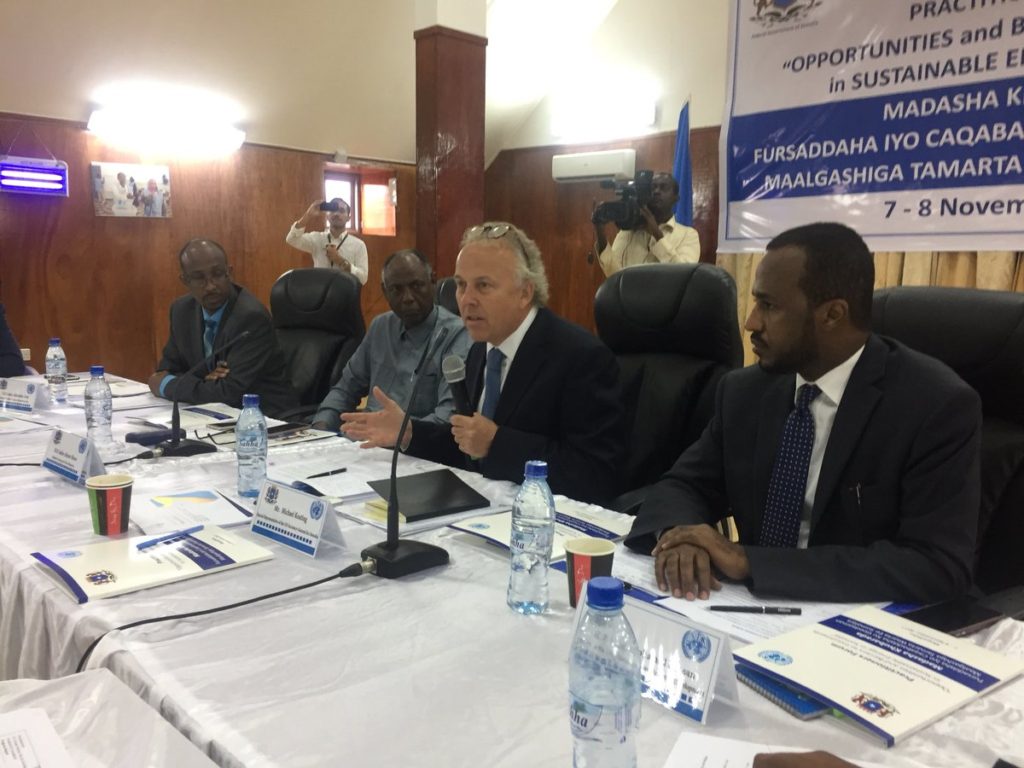Public-Private partnership key to sustainable energy in Somalia- Forum


A dedicated public-private partnership backed by effective policies and regulatory framework is key to achieving sustainable energy goals in Somalia, stakeholders attending an energy forum in Mogadishu Monday said.
The stakeholders, among them Somali government ministers, investors and the UN said sustainable energy was instrumental in achieving meaningful progress and stability in Somalia but its realization hinged on a strong partnership not only between the private and public sectors but also with international community.
PRIVATE SECTOR
The participants lauded the role played by the private sector in filling the gap left by absence of functioning government institutions especially during the war period noting the experience and expertise of the private sector should be tapped into to build viable investments in the energy sector.
Energy Minister Salim Ibrow said the private sector’s role cannot be gainsaid adding the government was ready to create the favorable environment and partnership to spur further growth.
“I congratulate private companies that stood in taking care of the energy needs of the public in the country but you also need the government to assist you in the field. The private sector needs to come together so that the government can approach you as one,” said Ibrow.
TRIANGULAR PARTNERSHIP
UN Special Representative to Somalia and head of UNSOM Michael Keating echoed the Minister’s remarks calling for enhanced collaboration with the support of the international community.
“Despite so many years of conflict and lack of strong institutions the private sector in this country works,” head of UN in Somalia Michael Keating said. “The question is, how can we benefit from your entrepreneurship, how can you benefit from the commitment of the government to move forward in this area and how can both of you benefit from the willingness and eagerness of the international community to facilitate change to achieve lift-off.”
Keating called on the stakeholders to leverage on the triangular partnerships to develop a successful model in rebuilding the energy sector.
GOVERNMENT’S COMMITMENT
Planning and Investment Minister Jamal Hassan underscored the government’s commitment to creating conducive environment for investors in the energy sector as captured in the country’s National Development Plan noting sustainable solutions to the sector would trigger a multiplier effect on the economy.
“I would like to assure future investors and that may be seated here today that my ministry particularly our investment department, the SomInvest together with international partners are working diligently to assess the main constraints, policies and regulatory frameworks which limit Somalia’s investment promotion and facilitation,” the minister said.
Public Works and Reconstruction Minister Sadiq Abdullahi said the energy sector in Somalia faced numerous challenges which called for a strong collaboration between the private sector and the government.
“Absence of sector regulation, lack of input e.g. technology and skilled labour incapacity are the major challenges to achieve sustainable development in our sector,” said Abdullahi. “By resolving these critical issues we can create better future for our children and future generations. Therefore, we must undertake this significant task with strong leadership to articulate a national strategy for sustainable energy in Somali with private sector leadership in mind.”
On his part, Somali Chamber of Commerce vice president Abdurahman Abdullahi said the business community welcomed the forum and was ready to work with the government in realizing the forum’s objectives. “As the Somali commerce chamber, we really welcome the practical meeting held for the energy sector which came the right time and made us reach at this juncture today where today the international community is ready to help us in terms of capacity building and development programs among them solar, wind and water energies.”
BIOMASS FUEL
The Forum which runs for two days seeks to explore investment opportunities in the energy, build ideas of establishing regulatory and policy frameworks and partnerships between the private sector, government and the international community.
A study by the African Development Bank in 2015 notes that Somalia’s dependence on biomass fuel-wood and charcoal remains the highest in the world with between 80-90% of households meeting energy needs through charcoal and wood. The report also indicates electricity costs in Somalia stand out as the highest in the world with consumers having to part with $1 per kilowatt. Neighbouring countries such as Kenya and Ethiopia charge $0.15 and $0.06 per kilowatt respectively.
These costs, Planning Minister Hassan said were inhibitive to investment in the country. “The tariffs that Somali businesses pay remain among the highest in the world which makes cost of electricity in Somalia perhaps one of the most pressing issues standing before the future investors of Somalia,” the Minister said, adding, “This fact impedes development of new business and threaten the thriving business development that has already occurred in the country.”
Ibrow said his ministry was working on drafting regulatory policies and laws for the energy sector to ensure proper regulation.
“We are working on now with the support of the international partners to draft the regulatory framework for energy. We hope in the next three or four months we will get it ready. That will make it easy to implement proper regulation of the sector. But in the absence of this law, we have no problem on what is going on in the energy sector.”